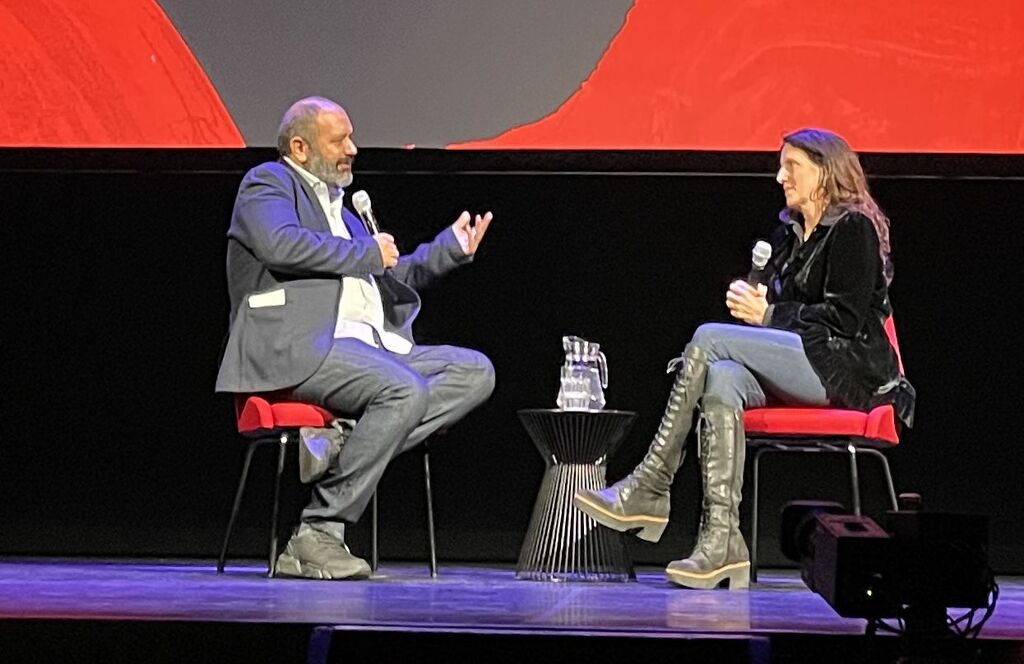All the Beauty and the Bloodshed is de nieuwste documentaire van Laura Poitras, dit jaar de eregast van het International Documentary Film Festival Amsterdam. IDFA is twee dagen in full swing en dit rijke, in Venetië met de Gouden Leeuw bekroonde portret van kunstenaar en activist Nan Goldin is zojuist vertoond in Theater Carré. Aansluitend is er nu de Master Talk met de regisseur. Een mooi woord voor het gesprek dat Orwa Nyrabia, artistiek directeur van IDFA, op het podium met haar heeft.
Dat we hier met twee gelijkgestemde zielen te maken hebben blijkt direct al wanneer Nyrabia oppert dat de titel All the Beauty and the Bloodshed ook heel goed kan slaan op het aanbod van IDFA. Hij gaat haar vast niet scherp ondervragen, maar haar wel gelegenheid geven aan de hand van haar films meer over haar motivaties en ervaringen te vertellen. Als er al eens verschil van mening is, dan is dat reden tot vrolijkheid. Ze kennen elkaar al langer. Toen ze elkaar tien jaar geleden in Berlijn ontmoetten zette Poitras persoonlijk een maaltijd op tafel. Want ja, ook daar heeft ze verstand van.
Regenboogvlaggen

Wanneer Nyrabia voorstelt helemaal bij het begin te beginnen, bevestigt Poitras dat ze inderdaad begon als kok. Aanvankelijk met een Tunesische chef als leermeester, en later een Japanse. Daarna ontdekte ze aan een kunstopleiding in San Francisco haar passie voor avant-garde. Om vervolgens de documentairewereld binnen te stappen wanneer filmmaker en activist Linda Goode Bryant haar meeneemt naar een stadswijk in Columbus, Ohio, waar de gentrificatie in volle gang is. In die grotendeels zwarte arbeidersgemeenschap kochten witte gays en lesbiennes huizen en hingen overal de regenboogvlag uit. Zou die ontmoeting van twee totaal verschillende werelden een beter begrip opleveren? Poitras geeft zelf het antwoord: een hartgrondig ‘nee’.
Die verkenning van ethische kwesties en machtsverhoudingen die ze samen met Goode Bryant maakte zou haar eerste documentaire worden: Flag Wars. Op IDFA te zien als onderdeel van het Poitras retrospectief. Flag Wars is begin van een reeks films waarmee Poitras niet alleen een voortreffelijk gevoel voor het medium aan de dag legt, maar ook getuigt van een onafhankelijke houding en kritische blik.
Die twee kanten kan ik illustreren door twee zaken naast elkaar te zetten. Ten eerste de Oscar die ze in 2015 kreeg voor Citizenfour, haar film over klokkenluider Edward Snowden. Ten tweede het feit dat de Amerikaanse veiligheidsdienst NSA haar na My Country, My Country (2006) op een lijst met staatsgevaarlijke personen plaatste en haar scherp in de gaten hield. Want ja, bij het filmen van deze impressie van de door haar als schokkend ervaren Amerikaanse invasie van Irak was ze niet braaf in de zogenaamde groene zone gebleven. Nee, iemand had haar in de rode zone zien filmen.
Irak
Nyrabia ziet in haar werk niet alleen die scherpe kritische blik maar telkens ook momenten van hoop.
Poitras illustreert dat met haar ervaring in Irak, waar ze acht maanden lang filmde voor My Country, My Country. Ze vond die zogenaamde bevrijding van Irak, die gepaard ging met martelingen, iets absurds. Maar toch leerde ze daar ook haar aanvankelijk cynische houding te herzien. De clip die we te zien krijgen toont niet alleen een Amerikaanse militair die bij de beruchte Abu Graib gevangenis verklaart dat een daar opgesloten negenjarig kind een gevaarlijk individu is. Er is ook die dokter uit Bagdad die weliswaar kritisch is, maar zich toch met moed en betrokkenheid voor zijn land blijft inzetten.
Er is weinig fantasie voor nodig om die moed en betrokkenheid ook te herkennen in Edward Snowden, de hoofdpersoon van Citizenfour, en in WikiLeaks-oprichter Julian Assange in Risk (2015).
Verantwoordelijkheid nemen
Nyrabia heeft opgemerkt dat Poitras over ‘wij’ spreekt als ze naar aanleiding van My Country, My Country stelt dat ‘wij Irak binnenvielen’. Betekent dit dat kritiek op Amerika haar liefde voor datzelfde land niet in de weg hoeft te staan? Waarop Poitras hem lachend van repliek dient. Nee, het woord ‘liefde’ wil ze echt niet gebruiken. Ze is nu eenmaal een burger van de Verenigde Staten, dus ze moet wel ‘wij’ zeggen. Het gaat haar om het nemen van verantwoordelijkheid, om het aankaarten van leugens. De risico’s die ze daarmee soms loopt relativeert ze direct met het voorbeeld van de actie van Chelsea Manning. Die Amerikaanse soldaat werd in 2010 in Irak gearresteerd wegens het naar WikiLeaks lekken van een opname van een Amerikaanse helikopteraanval op Bagdad. Je verantwoordelijkheid nemen, daar gaat het om, verklaart Poitras nogmaals.
Waarbij ze aangeeft dat de acties van Snowden, Assange en Manning, plus de onder druk staande persvrijheid, ook haar eigen motivatie een nieuwe impuls gaven. Nyrabia constateert in dit verband dat Poitras haar werkterrein verbreedde, onder meer met journalistieke projecten.
Top 10
Intussen ziet Nyrabia wel enige verwantschap tussen Poitras en de filmmakers die zij heeft uitgekozen voor haar Top 10 op IDFA. Inderdaad, zo bevestigt Poitras, gaat het niet om de allerbeste films die ze kent. De meeste uitgekozen titels betreffen werk van filmmakers die zich keren tegen staatsgeweld en andere repressie. Zoals This is Not a Film, de opstandige ode aan kunst en vrijheid van Jafar Panahi, die momenteel vastzit in een Iraanse gevangenis. Ook was ze zeer onder de indruk van The 3 Rooms of Melancholia van de Fin Pirjo Honkasalo. Een indrukwekkend poëtisch drieluik over kinderen te midden van het gewelddadige Russisch-Tsjetsjeense conflict. Ze noemt de aangrijpende scène van de zieke moeder die haar drie kleintjes meegeeft aan een vrouw die weeskinderen onder haar hoede neemt.

Het einde van de Talk komt in zicht, met nog maar weinig tijd voor Poitras’ laatste werkstuk, dat Nyrabia in het begin al aanhaalde: All the Beauty and the Bloodshed. Haar breed opgezette portret van de fotograaf Nan Goldin, die beroemd werd met haar intieme, voor die tijd hoogst onconventionele foto’s van non-conformistische subculturen. Om later minstens zo bekend te worden door haar strijd tegen de Sacklers. De familie die goede sier maakten als kunstsponsor terwijl hun bedrijf Purdue Pharma de beruchte verslavende en uiteindelijk vaak dodelijke pijnstiller oxycontin produceerde.
Activisme
Nyrabia merkt op dat All the Beauty een opvallend gelaagd portret is waarin de pijnlijke persoonlijke achtergrond van Goldin, haar kunst en haar activisme samenkomen. Ja, bevestigt Poitras, het is niet alleen een voortzetting van haar eerdere werk, maar ze betreedt hiermee ook nieuw terrein. Het begon als een verslag van de spraakmakende acties waarmee Goldin uiteindelijk musea bewoog de naam Sackler van hun gevel te halen. De film kwam in nauwe samenwerking met Goldin tot stand, en zo kon het uiteindelijk ook een persoonlijk verhaal over moed en emotionele kwetsbaarheid worden. Intens politiek en intens persoonlijk. We merken dat het Poitras nog steeds raakt.
Waar ik graag aan toevoeg dat het voor de huidige activisten ook een zeer inspirerende film kan zijn. Dat is de hoop, die al eerder ter sprake kwam.
Weten plus zien
Wanneer Nyrabis haar tot slot vraagt nog eens terug te blikken, merkt Poitras op dat All the Beauty eigenlijk ook teruggrijpt naar het begin. Want tijdens die kunstopleiding waar ze de avant-garde ontdekte had ze ook Goldin leren kennen. En ze leerde hoe beelden kunnen overtuigen, iets wat ze eerder in deze Talk al aangestipte in verband met Citizenfour. Wat was immers nog het belang van een documentaire over Snowden als zijn onthullingen al wereldkundig waren gemaakt? Dat was, stelt Poitras, dat je de nog jonge Snowden echt kon zien, het hem echt kon horen vertellen, en daardoor overtuigd raakte van zijn oprechte bevlogenheid.
Iets weten plus iets zien brengt verandering teweeg, zo vat ze het samen.
Van cynisme naar hoop, voegt Nyrabia daar aan toe. Want, zo is zijn eigen ervaring, mocht hij wel eens door het in veel documentaires getoonde onheil in de wereld door pessimisme overmand raken, dan hoeft hij maar naar het werk van nieuwe jonge talenten te kijken om weer een positieve ‘WOW’-ervaring te hebben. Afgaand op het applaus stemt de zaal daar van harte mee in.
IDFA is nog t/m 20 november in Amsterdam en een groot aantal andere locaties in Nederland. Voor het Amsterdamse festivalprogramma met films, nagesprekken, events, immersieve en interactieve installaties zie: www.idfa.nl
Daar ook meer over het programma rond Laura Poitras.
All the Beauty and the Bloodshed komt op 19 januari in de bioscoop.
